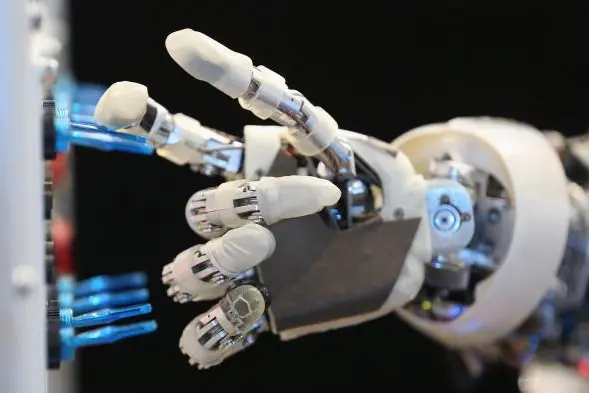PHOTO
Artificial Intelligence (AI), robotics and other forms of smart automation have revolutionised the present and future of work. These technologies have the potential to bring great economic benefits, contributing up to $15 trillion to global GDP by 2030, according to a PwC report on the impact of automation.
The UAE has been at the forefront of using AI to streamline processes through its National Artificial Intelligence Strategy 2031. The country appointed the world’s first Minister of State for Artificial Intelligence in 2017. Last week, UAE capital Abu Dhabi announced the establishment of the Mohammad Bin Zayed University of Artificial Intelligence, the first graduate level, research-based artificial intelligence university in the world.
The country is harnessing the power of AI in both public and private sectors to raise efficiency and reduce costs.
In September, Dubai's Majid Al Futtaim Retail employed Tally, an armless robot, at its Carrefour supermarket in the Mall of the Emirates. According to the company, Tally is 30 percent more accurate than human workers.
But as businesses rush to embrace these technologies to raise efficiency, millions of employees worldwide are terrified at the spectre of apocalypse headed their way, especially in manpower-centric industries.
Their fears are not completely unfounded.
According to the PwC report, 3 percent of jobs are said to be at potential risk of automation by early 2020s and 30 percent by mid-2030s.
Over the past centuries, tech innovation has eliminated many types of jobs. However, economies have evolved to create new jobs that have kept people employed.
Therefore, employees need not hit the panic button just yet about their dwindling future career prospects because these super-intelligent machines and robots might well be doing humankind a massive favour.
Automation of work will enable technology to replace the work of hands and the workplace of the future will probably include much more head-work. The new jobs that will come from AI and robots will require critical thinking, creativity, entrepreneurial initiative, and social interaction.
"It doesn’t necessarily mean that machines will reduce the number of jobs available, they will change the way we work and the definition of what ‘work’ is,” said Deseré Orrill, Chairman, OLE!CONNECT, a data-led marketing company.
However, it’s not just employees who face challenges in the new workplace frontier. Employers need to get a handle on issues such as understanding what the future of work means for employees and themselves, how to achieve executive support for new workplace initiatives, and how technology can play a game-defining role in human resources.
Business leaders must come to grips with leveraging new ways of working to create sustained results with digital literacy for the modern workforce, build a solid talent pipeline, close the skills gap and succession planning through reskilling, as well as engage in strategic workforce planning to harness AI in order to improve organisations, as well as their employees.
AI and machine learning cannot replace human creativity, sensitivity and sensibility, which are essential ingredients in all creative and caring professions, along with those where human intuition and the fabled ‘6th sense’ play a role.
"Humans in the workplace complete tasks with hands and heads but, also with heart," said Orrill.
Technology offers incredible support to humans and in future will contribute to the creation of positive, dynamic and fluid workplaces of the future.
“In fact, in advanced economies where greater use of robotics, automation and AI is prevalent, unemployment today is at the lowest it has been in decades," said Orrill.
It's apocalypse not now.
(Reporting by Mily Chakrabarty; Editing by Anoop Menon)
(mily.chakrabarty@refinitiv.com)
Our Standards: The Thomson Reuters Trust Principles
Disclaimer: This article is provided for informational purposes only. The content does not provide tax, legal or investment advice or opinion regarding the suitability, value or profitability of any particular security, portfolio or investment strategy. Read our full disclaimer policy here.
© ZAWYA 2019





















